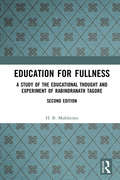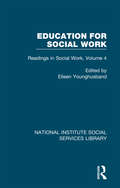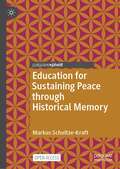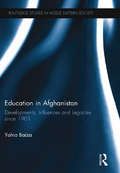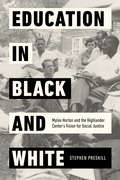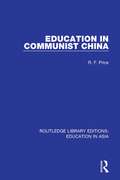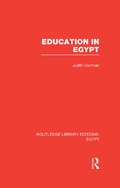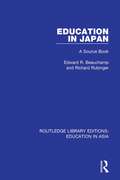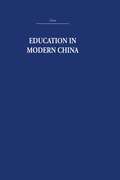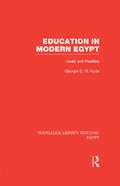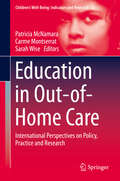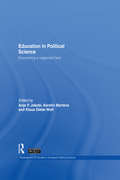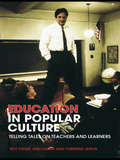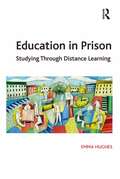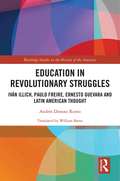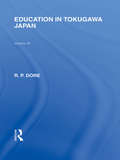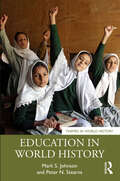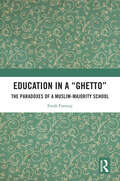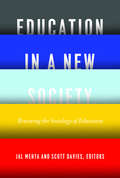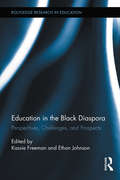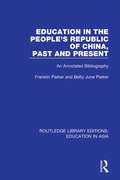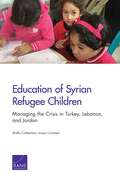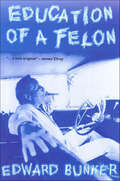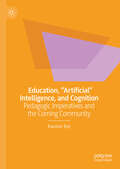- Table View
- List View
Education for Fullness: A Study of the Educational Thought and Experiment of Rabindranath Tagore
by H. B. MukherjeeThis volume is the first comprehensive exploration of Rabindranath Tagore’s works on education and pedagogy. It presents a valuable account of the creation of Santiniketan and Visva-Bharati, Tagore’s vision of social regeneration, and his rejection of the colonial scheme; while reflecting on significant events of his life and his ideas. The book evaluates Tagore’s unique contribution to education and discusses his views on fundamental issues, such as aim, method, discipline, and medium. It reinforces for readers today the relevance of his experiments and activities in the field of education. Drawing from various sources, the book also offers bibliographic information on Tagore’s writing on education. This new edition with a new Introduction and Foreword will be of immense value to educationists, teachers, policymakers, and those interested in modern Indian history and the philosophy of education.
Education for Social Work: Readings in Social Work, Volume 4 (National Institute Social Services Library)
by Eileen YounghusbandSome outstanding contributions to a better understanding of the issues of education for social work have been brought together in this volume, originally published in 1968. Because of the wide relevance of the subject these articles should be valuable not only to social work educators and field supervisors in many different parts of the world, but to others concerned with professional education. Today it can be enjoyed in its historical context.
Education for Sustaining Peace through Historical Memory (Memory Politics and Transitional Justice)
by Markus Schultze-KraftInformed by the author’s long-standing work on violent conflict, peace and education in countries of the Global South, particularly Colombia, this open access book presents a comprehensive narrative about the relationship between peace education, historical memory and the sustaining peace agenda, advocating for the adoption of a new perspective on education for sustaining peace through historical memory. Education on and for peace in countries wrestling with, or emerging from, protracted violent conflict is up against major challenges, and both conventional and critical approaches to peace education are limited to address these. Incorporating a focus on historical memory, without losing sight of its own pitfalls, into peace education can support learners and teachers to come to grips with achieving positive, peace-sustaining change at both the micro (individual) and macro (social and institutional) levels, and to develop concepts and practices of effective and legitimate alternatives to violence and war. Conceived in these terms, historical memory-oriented peace education also stands to enhance the work-in-progress that is the UN-led sustaining peace agenda, including its Sustainable Development Goals.
Education in Afghanistan: Developments, Influences and Legacies Since 1901 (Routledge Studies in Middle Eastern Society)
by Yahia BaizaA comprehensive and up to date study of the history of education in Afghanistan since 1901, this book demonstrates how modern education emerged and charts its fluctuating process of development, regression and destruction. Combining historical and contemporary analysis of key international and national, political, and historical issues from the late nineteenth century to the present day, Education in Afghanistan examines; religion, modernism, tribal and ethnic conflict, language discrimination, foreign invasions, war, and international assistance through the lens of education. An in-depth understanding of these elements will provide alternative approaches to addressing the on-going conflict in Afghanistan, which has a direct effect on the overall educational development and policy-making decisions in the country. Offering a new perspective to the conflict in Afghanistan by addressing its impact on education, this book will be an invaluable resource for students and researchers interested in the formation of education policy, social and political reform in the Middle East, and Islamic Studies.
Education in Black and White: Myles Horton and the Highlander Center's Vision for Social Justice
by Stephen PreskillHow Myles Horton and the Highlander Folk School catalyzed social justice and democratic education For too long, the story of life-changing teacher and activist Myles Horton has escaped the public spotlight. An inspiring and humble leader whose work influenced the civil rights movement, Horton helped thousands of marginalized people gain greater control over their lives. Born and raised in early twentieth-century Tennessee, Horton was appalled by the disrespect and discrimination that was heaped on poor people—both black and white—throughout Appalachia. He resolved to create a place that would be available to all, where regular people could talk, learn from one another, and get to the heart of issues of class and race, and right and wrong. And so in 1932, Horton cofounded the Highlander Folk School, smack in the middle of Tennessee.The first biography of Myles Horton in twenty-five years, Education in Black and White focuses on the educational theories and strategies he first developed at Highlander to serve the interests of the poor, the marginalized, and the oppressed. His personal vision keenly influenced everyone from Rosa Parks and Martin Luther King, Jr., to Eleanor Roosevelt and Congressman John Lewis. Stephen Preskill chronicles how Horton gained influence as an advocate for organized labor, an activist for civil rights, a supporter of Appalachian self-empowerment, an architect of an international popular-education network, and a champion for direct democracy, showing how the example Horton set remains education’s best hope for today.
Education in Communist China (Routledge Library Editions: Education in Asia #8)
by R.F. PriceThis book, first published in 1970 and revised in 1975, lays out the background to the Chinese educational system and attempts of the communist leadership to reform the school system. It analyses the educational implications of the Cultural Revolution and the difficulties Mao faced in his attempts to introduce new educational policies. This book forms a valuable case study in the reform of education.
Education in Egypt: Egypt: Education In Egypt (Routledge Library Editions: Egypt)
by Judith CochranEgyptian education is a central, social and economic force in the Middle East. For hundreds of years Al Azhar University has been the centre of Islamic thinking and education. More recently Egypt became the leader in secular education as Mohammed Ali established the first medical, veterinarian, engineering and accounting schools in the Middle East. Nasser expanded Egyptian educational leadership by providing free education for Muslem students from neighbouring countries. The extensive exportation of Egyptian educators to initiate and educate in schools and universities throughout the Arab speaking world has shaped the secular and religious leaders of those countries. This book traces the history of Egyptian education over the last hundred years and highlights the key factors which have given Egyptian education its particular quality and influence within the Arab world. First published 1986.
Education in Japan: A Source Book (Routledge Library Editions: Education in Asia #9)
by Richard Rubinger Edward R. BeauchampThis book, first published in 1989, includes essays on a number of the most important topics in Japanese education as well as the highly selected, and annotated, bibliographies. It is the editors' belief that understanding educational matters requires insight into the historical context, and have therefore placed contemporary Japanese educational matters in historical perspective.
Education in Modern China
by R.F. PriceFirst published in 1970 this re-issues the revised edition of 1979. This book examines the part played both by tradition and by the Cultural Revolution in the educational system of twentieth century China and explores the apparent reversal of policy which took place since the death of Mao. The book discusses the writings of Mao on the nature of man, society and knowledge and his ideas on education. These are then seen in the context of history, philosophy and religion. Educational aims and policies are discussed, showing how factors such as language, geography, economics and the social structure created obstacles to reform.
Education in Modern Egypt: Ideals and Realities (Routledge Library Editions: Egypt)
by Georgie D.M. HydeThis study gives a comprehensive account of the evolution of the educational system in Modern Egypt, set against the events of the last twenty five years. From the Revolution of 1952, which saw the breakdown of the party system, seen as ‘sham democracy’, to the re-adoption of the party system in 1976, the Egyptian government has searched for an ideal system that is secular, but not irreligious, and benefitting from, but not copying, the western or eastern models. Professor Hyde has analysed the problems of the educational system, administrative, institutional, theoretical and practical, and related them to Egypt’s urgent need to modernise the state, and to improve the quality of life of her hitherto deprived masses. The deficiencies of the system are discussed with emphasis on the attempts to provide solutions, mainly within the framework of reformed institutions. Informal and private education, literacy campaigns, women’s aspirations and student welfare are all considered, as are policies and plans for the immediate and long-term solutions of Egypt’s problems. The analysis also takes into account socio-economic factors in post-Revolutionary Egypt which not only constitute instruments of change in Egyptian society but also provide the restraints which prevent the rapid translation of educational ideals into reality. First published 1978.
Education in Out-of-Home Care: International Perspectives on Policy, Practice and Research (Children’s Well-Being: Indicators and Research #22)
by Sarah Wise Carme Montserrat Patricia McNamaraThis book draws together for the first time some of the most important international policy practice and research relating to education in out-of-home care. It addresses the knowledge gap around how good learning experiences can enrich and add enjoyment to the lives of children and young people as they grow and develop. Through its ecological-development lens it focuses sharply on the experience of learning from early childhood to tertiary education. It offers empirical insights and best practices examples of learning and caregiving contexts with children and young people in formal learning settings, at home and in the community. This book is highly relevant for education and training programs in pedagogy, psychology, social work, youth work, residential care, foster care and kinship care along with early childhood, primary, secondary and tertiary education courses.
Education in Political Science: Discovering a neglected field (Routledge/ECPR Studies in European Political Science)
by Anja P. Jakobi Kerstin Martens Klaus Dieter WolfThis pioneering volume is devoted to the analysis of education from the perspective of political science, applying the full range of the discipline's analytical perspectives and methodological tools. The contributions demonstrate how education policy can be explored systematically from a variety of political science perspectives: comparative politics, public policy analysis and public administration, international relations, and political theory. By applying a governance perspective on education policy, the authors explore the changing institutional settings, new actors' constellations, horizontal modes of interaction and public-private regulatory mechanisms with respect to the role of the state in this policy field. The volume deals with questions that are not merely concerned with the content or outcomes of education, but it explicitly takes a political science view on how education politics work. Including country case studies from the Americas and across Europe, institutional analyses of education policy in the EU and the WTO/GATS as well as normative reflections on the topic, the volume provides a grand overview on the diversity of issues in education policy. Dealing with a so far neglected field of policy, this book provides a comprehensive and accessible analysis of a rapidly changing topic. Education in Political Science will be of interest to scholars and students of political science, education, sociology and economics.
Education in Popular Culture: Telling Tales on Teachers and Learners
by Roy Fisher Christine Jarvis Ann HarrisEducation in Popular Culture explores what makes schools, colleges, teachers and students an enduring focus for a wide range of contemporary media. What is it about the school experience that makes us wish to relive it again and again? The book provides an overview of education as it is represented in popular culture, together with a framework through which educators can interpret these representations in relation to their own professional values and development. The analyses are contextualised within contemporary, historical and ideological frameworks, and make connections between popular representations and professional and political discourses about education. Through its examination of film, television, popular lyrics and fiction, this book tackles educational themes that recur in popular culture, and demonstrates how they intersect with debates concerning teacher performance, the curriculum and young people’s behaviour and morality. Chapters explore how experiences of education are both reflected and constructed in ways that sometimes reinforce official and professional educational perspectives, and sometimes resist and oppose them. Education in Popular Culture will stimulate critical reflection on the popular myths and professional discourses that surround teachers and teaching. It will serve to deepen analyses of teaching and learning and their associated institutional and societal contexts in a creative and challenging way.
Education in Prison: Studying Through Distance Learning
by Emma HughesThe role of education in prisons, prisoners' decisions regarding education, the impact of prison culture on either encouraging or discouraging such activities, and the potential consequences of education for prisoners' reentry into society all have important implications. This extended analysis of prisoner education represents a unique contribution to an under-researched field, whilst also making important and original connections between research on education in prison and the literature on adult learning in the community. Through offering crucial insights into the varied motivations and disincentives that inform prisoners' decisions to study in prison (whether it be through distance learning or prison-based classes), the reader is also able to consider factors that inform decisions to engage in a broader range of positive and constructive activities whilst in prison. These research findings provide insight into how prison culture and prison policies may impact upon rehabilitative endeavour and suggest ways in which prisons may seek to encourage constructive and/ or rehabilitative activities amongst their inhabitants if desired. Based on interviews and questionnaires completed by British adult prisoners studying through distance learning, this qualitative study offers a valuable complement and counterpart to prison education studies that focus on measuring recidivism rates. The learner-centred approach used yields a nuanced and complex understanding of the varied ways in which education in prison actually operates and is experienced, and considers the consequences of this for the students' lives. As such, the findings offer further insight into important evidence resulting from recidivism studies reviewed within the book, whilst contributing to the reemerging interest in studies of prison life and prison culture that are based on prisoner interviews.
Education in Revolutionary Struggles: Iván Illich, Paulo Freire, Ernesto Guevara and Latin American Thought
by Andrés Donoso RomoEducation in Revolutionary Struggles introduces us to the fascinating world of Latin American educational thought in the third quarter of the 20th century. It discusses the contributions of three of the most distinguished intellectuals of the period – Iván Illich, Paulo Freire and Ernesto Guevara – and more specifically their answers to the eternal challenge: What is – or should be – the role of education in the profound structural and/or revolutionary transformation of our societies? The first part of the book identifies the cultural, economic and political context of the revolutionary years in Latin America. This historical framework is of particular interest because it is the setting for the intellectual and educational debates in which these three thinkers took part. The second part, the heart of the book, expounds in depth how Iván Illich, Paulo Freire and Ernesto Guevara contributed to understanding of how education is linked to the transformation of society. The third and final part highlights the most fertile dimensions of the educational thought of Iván Illich, Paulo Freire and Ernesto Guevara – deschooling, liberation education and revolutionary education respectively – and analyses the points where their conceptions of "education in revolutionary struggles" converged, complemented one another or diverged.
Education in Tokugawa Japan (Routledge Library Editions: Japan)
by Ronald DoreJapanese cultural life had reached a low ebb at the beginning of the Tokugawa period. The Japanese society which emerged when Tokugawa Ieyasu had completed the process of pacifying warring baronies was neither literary, nor hardly literate. The rulers were warriors and the people they ruled were largely illiterate. The Japan of 1868 was a very different society: practically every samurai was literate and it was a world in which books abounded. The transformation which had occurred in these two and a half centuries was an essential precondition for the success of the policy which the leaders of the Meiji Restoration were to adopt. An in-depth survey of the development and education during the period, this book remains one of the key analyses of the effects of Tokugawa educators and education on modern day Japan.
Education in World History (Themes in World History)
by Peter N. Stearns Mark S. JohnsonEducation in World History shows how broad currents in transnational history have interacted with trends in educational organization and teaching practices over time. From antiquity and early classical societies to present day, this book highlights the ways in which changes in religious and intellectual life and economic patterns in key world regions have generated developments in education. Since the postclassical period, cross-cultural connections have also influenced educational change. In more recent times, transnational dialogues and mobility have played a vital role in shaping educational patterns. Ranging through South and East Asia, Africa, Europe and the Americas, the book also considers how the impact of modern forces, such as industrialization and nationalism, have transformed education in fundamental ways. Throughout the volume, Mark S. Johnson and Peter N. Stearns emphasize the tensions between elite and state educational interests and more diverse popular demands for access and, often, for more innovative pedagogy. Suitable for introductory world history and history of education courses, this lively overview reconsiders the history of education from the perspective of world and comparative history.
Education in Youth Detention Homes: An Ethnographic Study of Schooling Against the Odds (Routledge Frontiers of Criminal Justice)
by David WästerforsDrawing upon meticulous ethnographic analysis and unique data sources, this book dissects the multifaceted challenges and occasional victories encountered by both educators and detained youth in Sweden.Originally published in Swedish, this book provides fresh insights into a crucial aspect of youth care and education. Theoretical underpinnings draw from ethnomethodology’s focus on members’ accounts, complemented by C. Wright Mills’ framework of motives and Erving Goffman’s seminal studies on total institutions. The book also includes seven practical suggestions directed to teachers, but also to pupils, treatment staff, and institutional managers, that aim for translating analytical insights into everyday practice.Education in Youth Detention Homes will be of interest to researchers and students in criminology, sociology, social anthropology, and social work, as well as to professionals in the field of education for young people at risk of crime, psychosocial problems, and social exclusion.
Education in a 'Ghetto': The Paradoxes of a Muslim-Majority School
by Farah FarooqiThis book explores the structures of power and politics within a government-aided school situated in a Muslim-majority area in Delhi, India. It provides a look into how teachers, administrators and students in low-income and disadvantaged communities navigate limited opportunities and resources. The book discusses the socio-economic and cultural background of students, institutional rituals and practices and the impact of power relations on the students. It critiques the power and privilege of those in positions of authority in the school and showcases how bureaucratic systems in state run schools often do not consider the circumstances and interests of students and often hinder their growth. This book will be of interest to students of education, sociology, development studies, political science and social work. It will also be useful to educationalists, sociologists, political scientists, NGOs and those interested in the interface of state, society and education.
Education in a New Society: Renewing the Sociology of Education
by Jal Mehta Scott DaviesIn recent decades, sociology of education has been dominated by quantitative analyses of race, class, and gender gaps in educational achievement. And while there’s no question that such work is important, it leaves a lot of other fruitful areas of inquiry unstudied. This book takes that problem seriously, considering the way the field has developed since the 1960s and arguing powerfully for its renewal. The sociology of education, the contributors show, largely works with themes, concepts, and theories that were generated decades ago, even as both the actual world of education and the discipline of sociology have changed considerably. The moment has come, they argue, to break free of the past and begin asking new questions and developing new programs of empirical study. Both rallying cry and road map, Education in a New Society will galvanize the field.
Education in the Black Diaspora: Perspectives, Challenges, and Prospects (Routledge Research in Education)
by Kassie Freeman Ethan JohnsonThis volume gathers scholars from around the world in a comparative approach to the various educational struggles of people of African descent, advancing the search for solutions and bringing to light new facets of the experiences of black people in the era of globalization.
Education in the People's Republic of China, Past and Present: An Annotated Bibliography (Routledge Library Editions: Education in Asia #10)
by Franklin Parker Betty June ParkerThe 3,053 entries in this work, first published in 1986, comprise the compliers' attempt at a comprehensive annotated bibliography of the most useful locatable books, monographs, pamphlets, regularly and occasionally issued serials, scholarly papers, and selected newspaper accounts dealing in a significant way with formal and informal, public and private education in the People's Republic of China before and since 1949.
Education of Syrian Refugee Children
by Louay Constant Shelly CulbertsonWith four million Syrian refugees as of September 2015, there is urgent need to develop both short-term and long-term approaches to providing education for the children of this population. This report reviews Syrian refugee education for children in the three neighboring countries with the largest population of refugees--Turkey, Lebanon, and Jordan--and analyzes four areas: access, management, society, and quality.
Education of a Felon: A Memoir
by Edward Bunker“A masterful summation of the hard and brutal life of crime and prison from . . . America’s foremost chronicler of prison life.” —Los Angeles TimesIn Education of a Felon, the reigning champion of prison novelists finally tells his own story. The son of an alcoholic stagehand father and a Busby Berkeley chorus girl, Bunker was—at seventeen—the youngest inmate ever in San Quentin. His hard-won experiences on L.A.’s meanest streets and in and out of prison gave him the material to write some of the grittiest and most affecting novels of our time.From smoking a joint in the gas chamber to leaving fingerprints on a knife connected to a serial killer, from Hollywood’s steamy underside to swimming in the Neptune pool at San Simeon, Bunker delivers a memoir as colorful as any of his novels and as compelling as the life he’s lead.“Bunker writes in straight-ahead, unadorned prose and, refreshingly, he refrains from excessive psychologizing and sentimentalizing . . . a rough-hewn memoir by a rough-hewn man.” —The New York Times Book Review“In this picaresque, harrowing, humorous yet deeply sad excursion through his dark-starred youth, Bunker—arguably the most renowned convict writer in America—serves as both participant in and witness to the mid-century carnival of L.A. crime immortalized by James Ellroy . . . a thought-provoking and richly re-created tale of a career criminal.” —Publishers Weekly
Education, "Artificial" Intelligence, and Cognition: Pedagogic Imperatives and the Coming Community
by Kaustuv RoyThis book initiates fresh pedagogic thinking on the nature of intelligence and human potentiality in the midst of a rising panic over so-called artificial intelligence. At the rate of current advancement, entire social and cultural landscapes including education and work are going to change in unprecedented ways in the near future. In light of these developments, the author sets out to critically assess the role of education in creating the capacity to distinguish between machinic &“intelligence&” and organic intelligence, thus helping us move from passive acceptance to active becoming.
